This interview took a while to get, and that was all my fault. 🙂 Russell had (many moons ago) agreed to the interview, and I took my sweet time to send him the questions, largely because life got in the way, but here it is now! Enjoy! 🙂
First off, welcome to the South African SFF-reading public, Russell, and thank you for doing this interview! 🙂
Firstly, would you please tell us a bit about yourself?
Basic stuff first. I’m 47 years old, married with two boys at university. I did a PhD in Geography and I teach part-time at the University of Waikato. I run an atlas-making company, and we are currently finishing an atlas of Bahrain.
Those are the bare bones. To add flesh to the bones, I need to tell you that I’m obsessive, passionate and driven. I read a great deal – three novels a week. I’m a huge music fan, play golf to a two handicap, enjoy almost every sport, collect Lego and Cornishware, and absolutely adore immersing myself into long-running projects. Making atlases and novels is my idea of heaven.
What can readers expect when they pick up one of your books?
Again, the simple answer first. I write within the epic fantasy tradition: that is, large-scale fantasy with world-changing events. Fate of the world in the balance and all that. I make no apologies for this. What’s the point of fantasy if we can’t occasionally imagine ourselves at the nexus of events?
But the more fundamental answer is that readers should expect to be immersed in a complex world with memorable characters. They should prepare themselves for moments of surprise and terror, and they should be aware that I am trying to move them. They should be prepared to do some work, too. My books contain a great deal of ‘set-up’. If I can’t make you care for the world and its people, why should you care what happens to it? So there are times when you will wonder why I’m not cutting straight to the gory bits. Be patient: I intend you to get there in time.
You’ve completed your first epic fantasy series, and have embarked on a new series – what were the lessons you learned as a storyteller during the process of writing these novels?
This is a question I have thought carefully about over the last few years. I’ve heard a number of authors talk disparagingly about their early published work, as though they wish it would disappear. I don’t feel like that, even though I believe I’m a much better writer now than I was in the 1980s when I began Across the Face of the World.
So yes, I’ve learned lessons, chief among them being to take risks with the storyline and characters. My first series was carefully plotted, and as a result runs in a linear fashion. I decided not to do this with my second series, and instead I have given the story and characters greater autonomy. The result is a story with much greater depth, and characters that are more prone to surprise – even to surprise me.
In my first series the map dictated the story, and with the second series the story dictates the map. Subtle but crucial difference.
I really knew very little when I began to write. I had no idea, for example, about Point of View, and the first series is written by accident in Third Person Omniscient, which is rather rare these days. I don’t think I would do that again, but I like the feel of the narrative it created.
You are also a cartographer, and your novels have some of the most detailed and life-like maps of any epic fantasy out there – how important, in your opinion, are maps to the genre?
Less important these days, as writers move away from epic fantasy to embrace quirky and fascinating alternatives. I’m certainly not an advocate for maps in fantasy novels – I’ve seen some dreadful ones. You know what I mean – all pointy witch’s hats and silly names and half a dozen villages, so ridiculously simplistic that the first impression the book gives you is how much poorer this fantasy is than reality. Why would you want to read a book like that?
If you’re going to use a map, make it big, make it complex, make it consistent, make it believable, cram it to overflowing with stuff you’ve imagined so that people will believe that your world is a viable alternative to the one they live in. You’ve created a new world, and your readers are like explorers venturing into an unknown land, You’d give them the best map you could, wouldn’t you?
With fantasy changing as a genre and the emphasis turning to grittier, un-formulaic storylines, what do you feel began this shift, and do you see it as a good or a bad thing?
‘Too much of a good thing’ is what began the shift away from traditional epic fantasy. Certain successful fantasy authors seemed – shall we say – reluctant to finish their profitable series, and a storyline that might have taken a chapter in Book 1 now takes an entire book. Then we get sequels and prequels and even after the authors pass away the machine they’ve set up doesn’t stop. Sons or friends continue the series. And each instance whittles away the readership for good epic fantasy.
Well, if we’re going to behave like that. we’ll get what we deserve. Reader interest will shift to authors who can finish their stories with economy. As for the amount of grit in current stories, I can’t say I have a preference. Depending on the story, such visceral writing can be entirely appropriate. Where it fails, though, is when it becomes a device in itself.
There’s been a lot of talk about moving away from formula towards originality. Who could object to that? Well, I’ve read some of these ‘original’ stories, and my opinion, is that if you read the blurb on the back of a book and it says ‘original’ or ‘chock-full of ideas’ or some-such-like, avoid it like the plague. The story is the thing. If originality is a story’s major merit, be prepared for an experience akin to eating gravel. Lots of interesting sharp edges, but in the end indigestible. By all means look for originality, but where you want freshness is in the author’s voice. There’s nothing original to be discovered in the field of human conflict, which ought to be at the heart of all good stories.
What have you found to be the best way of relaxing during or between projects? Are there ever enough hours in the day? 🙂
Never enough hours in the day. I seldom go to bed having done all I want to. I am already regretting how short life is. So, what is this word ‘relaxing’? What does it mean?
Well, there’s golf, I suppose, but I never play golf with anything other than full intensity, so there’s no relaxing in that. I do gardening like I’m killing my worst enemy. I listen to music for stimulation, not relaxation. Actually, I suppose I’m at my most relaxed working on a nice map.
I do enjoy travelling. That’s relaxing. Hiking is relaxing – if I can make myself walk rather than run. Occasionally I get time to make a Lego model (usually Christmas day). That’s marvellously relaxing. And reading, of course, though I get so drawn in by a good book I can barely breathe.
With more and more books being released as e-Books, do you think that the printed word will ever be replaced with bytes, buttons and screens?
Eventually the printed word will be replaced by something. Actually – though I know this isn’t the answer you were after – I think the printed word is being replaced as we speak. The students I teach at University are barely literate, even the best of them, because they get their information by watching, not reading. They consume television and movies and YouTube. Each of these is a wonderful thing, but you only learn to write by reading, and the evidence of these essays sitting on my desk at the moment tells me how little these people read. The printed word, and the imagination it inspires, is being replaced – has been replaced – by the snappy one-liner. You know, the Indiana Jones come-back. The hero has time to deliver the witty comment even while wrestling with the snake. Hollywood is crushing the life from the novel industry, and it is a real shame. A tragedy.
Are there any authors, both in the genre and out of it, whose work you follow?
A myriad, actually. I’m a voracious and uncritical reader. I find it frigheningly easy to immerse myself into a novel. First time I read Clavell’s Shogun I went around for a week afterwards grunting in bastard Japanese. But there are some authors who I think are really worth reading. C.S. Lewis, of course, who underneath all the religion had an acute eye for character, and for what makes us tick. Julian May’s 1980-95 masterwork, the interlinked ‘Saga of the Exiles’ and ‘Galactic Milieu’ is universe-encompassing space opera with the redemption of a devil at its heart. Glenda Larke, a lesser-known author, writes with unparalleled acuity, and she knows how to make the most of a novel-sized idea. It’s a tragedy she’s not more widely known. Dan Simmons and Alastair Reynolds are the best of the current science fiction storytellers. Guy Gavriel Kay writes the most lyrical work I’ve ever read, and produces nothing but gold. Lois McMaster Bujold is without peer at characterisation. And Terry Pratchett is our leading moralist. If you know his work, think about what I’ve just said for a moment. I could go on …
With bloggers such as myself (and so many others) doing what we do, are the days of critics working for magazines and such numbered?
I doubt it. The world is hungry for critics, for good and bad reasons. We enjoy hearing from experts, and we love reading about Big Names being torn down with cynical words from critics. In fact, it’s become something of a global sport these days. Critcs say the most outrageously hurtful things under the guise of ‘fair criticism’’. I read reviews that say nothing about the book but everything about the author or the genre or about the critic. How is that helpful to the reader? And that’s what many of these critics become: purveyors of hate and jealously.
Having said that, there are also critics – in the print media and on line – who are really worth reading. They actually read a book and not just the blurb on the back cover. They can identify the target audience, and explain how successful the book is in meeting that audience. People who can do that will never have their days numbered.
What have you got coming up next that we can all look forward to?
I’ve just written the last word of my second series, The Broken Man. It’s darker, pacier and altogether more challenging than my first series, and this is deliberate, as it explores the shadows the first series threw into relief. I’m taking a couple of weeks to catch up on work I’ve left outstanding – such as on-line interviews – and will then immerse myself into a new world, one that stretches over time as well as space. With the tentative title of ‘Time Traders’, it is as much science fiction as fantasy.
Finally, since most of those who read fantasy have a brilliant book inside them, waiting to be written, what advice do you have for them?
Write it.
I mean that. There seems to be this realy strange view amongst authors that we ought to put as many obstacles in front of prospective writers as possible. Tell them how difficult it is to get published. How you have to write a million words before you can call yourself a writer. How you should do everything you can to put a writer off writing, and if they stick at it despite our advice to give up, then they have a true calling.
Arrant nonsense, all of it. Writing is its own reward. I wrote two books with no intention of getting published. I wanted to explore this world I’d made up, so I sent some characters out into the snow to see what they’d find. Why not write as a hobby? Worry about publishing and all that stuff after you’ve written a good story.
Writing is ninety per cent perseverance, and ten per cent talent. There are a million brilliant but half-fnished novels buried in the backs of drawers. Be one of the ten per cent and finish what you start. If you enjoy the process, you’ve already been paid off. And if you don’t enjoy it, find a hobby you do enjoy.
Thanks, Russell, for giving up your time to answer these few questions.
🙂 We all wish you continued success and beautiful characters and worlds. 🙂
And here’s a treat (which you may or may not have already seen) – the blurb for the third book in the Broken Man series!
Broken Man, Book 3: Beyond the Wall of Time
The Gods have broken through the wall of time and are now bent on ravaging the world. Only a handful of people understand what is actually happening, but they in turn are under the control of the malevolent Husk. Stella, a queen in hiding, has to deal with the potentially traitorous Undying Man. He has offered to help, but of course has his own agenda. Noetos still seeks revenge for the deaths of his loved ones, but is yet to realise his enemy is one of his companions. And the unconventional cosmographer Lenares is the only one with the power to prevent the Gods destroying the world – if she can get the others to believe her. The queen, fisherman and cosmographer must travel to Andratan to confront Husk. But whether they can break free of his hold on them, and defeat the Gods, is another matter entirely.
For more info on Russell, follow this link to his site. 🙂
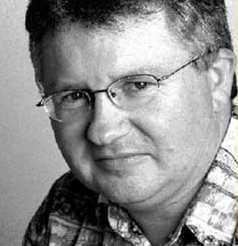
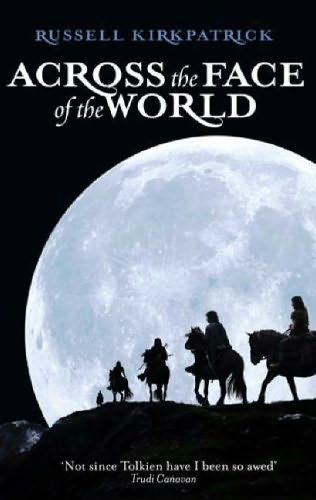
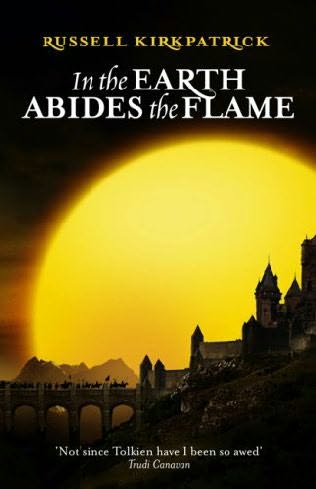
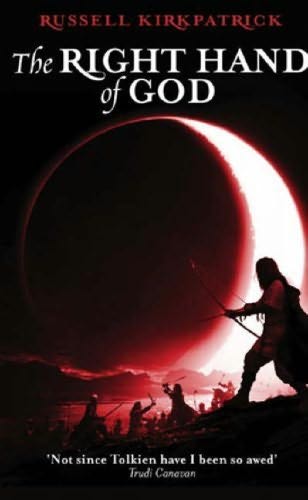
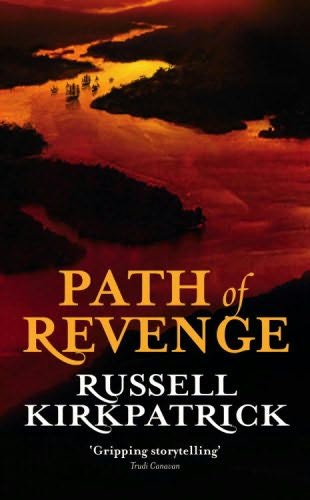






















One response to “An Interview with Russell Kirkpatrick”